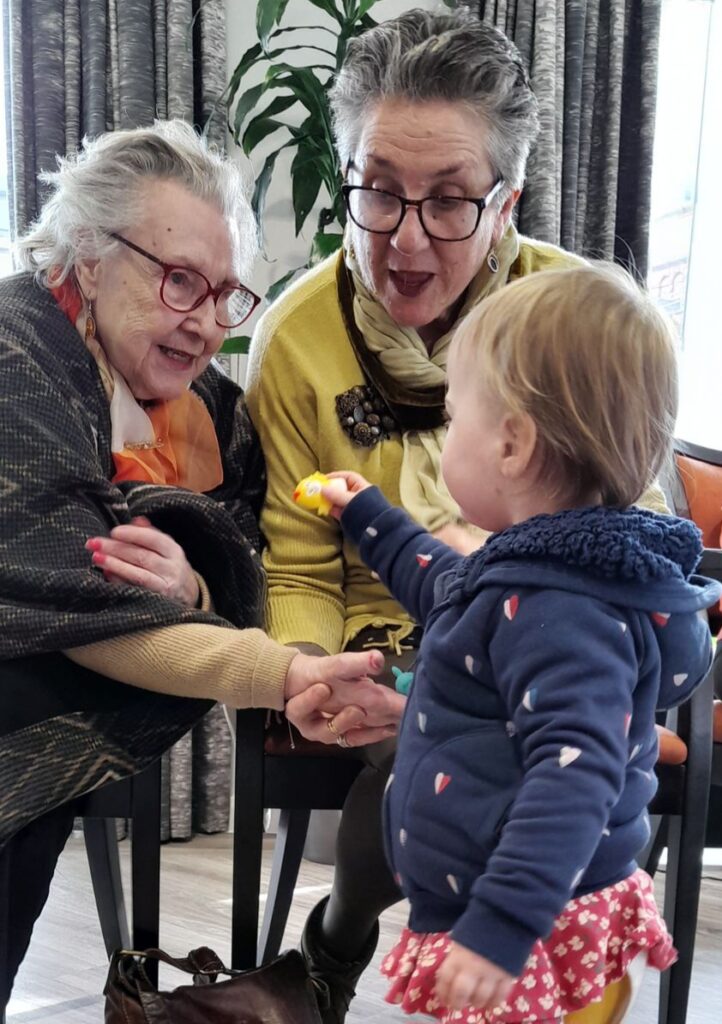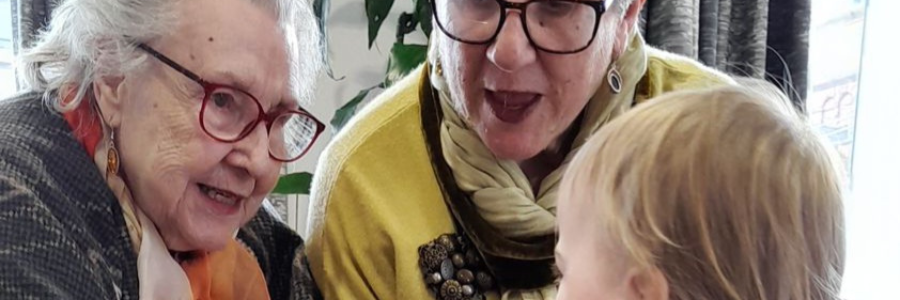Ready Generations: Encouraging intergenerational connections

Ready Generations is a Liverpool based charity working to connect people of all ages. In this blog Sue Egersdorff , Co-Founder of the charity reflects on their largest project – running a fully integrated children’s nursery in the heart of a care village in Chester, UK.

The power of intergenerational practice
‘My best friend is Bill – come and play with us’ said Jacob aged 3. I looked over to see Bill with his head in a box of blocks. Bill is 90 years old and a much loved and respected member of our intergenerational community. He spends significant parts of his day with the nursery children and we see him as, not only a friend, but an important mentor and educator.
Through our charity, Ready Generations, co-founder Liz Ludden and I operate a 25 place nursery in the heart of a Belong Care Village in Chester. We are both fixated on learning more about the potential of intergenerational practice as an authentically human model of inclusive care, learning, and community development. We have become disillusioned with some traditional service delivery models that often act transactionally, pushing people into prescribed directions according to perceived need e.g. age, ability, gender. This can create entrenched silos which seem only to add to division and marginalisation.
Revisiting community structures and values
In unexpected ways, the aftermath of the pandemic has made many people think more deeply about relationships and what really matters in terms of belonging, caring, nurturing and learning. People have revisited community structures that appeared to have been lost to a time when community was based around geographical location, family, kinship and employment. Such structures allowed for reciprocity in terms of care for children, the vulnerable and older people. They put individual strengths and capabilities to good use for the benefit of everyone. People understood their responsibilities and were accountable and active in their participation and contribution.
We believe in such strength-based approaches where shared understandings and solidarity matter. Everyone has a gift, passion or unique interest to share. As early years educators, we are constantly thinking about the uniqueness of each child and the importance of child-centred practice which extends so seamlessly into person-centred care for older people.
A resilient learning community of all ages
What we have experienced, since the opening of our intergenerational nursery, is the expansive teaching power and potential offered by older people when they feel respected and invited to join in. Increasingly marginalised, hidden and at worst vilified for costing too much in mainstream circles, our older community have been nothing but an immensely rich, active and playful teaching and learning resource to us.
They have all the qualities of great educators – patience, active listening, empathy, engagement and passion for the wellbeing of future generations. As many might wrongly assume, they are not stuck in the past but activists for a sustainable and dynamic world! We have learned so much from them. They have supported, challenged and kept us focused on our vision for a resilient learning community of all ages. They have acted with integrity, wisdom and compassion in supporting educational improvement and effective learning.
Above all, they have strengthened our resolve to invite early years settings, schools, youth services, community groups, local authorities and housing associations to reflect on how services are provided, who is seen to be in charge, who actually leads and who scaffolds care and learning that is both effective and aspirational.
A shared vision of belonging, aspiration and progress
Transformational change involves intentionally pushing at the boundaries, sharing control, doing more, talking less, being brave and taking risks. For example, we have faced important concerns around safeguarding and infection control. Whilst these take sensitive and ongoing discussion, with the development of robust structured systems and shared processes they have been safely managed and not restricted progress in anyway.
It feels that for our most marginalised communities little is improving. Burdensome language is often used to describe many such communities and the growing issues and cost of an ageing population appears not to be a priority. The Government’s introduction of Family Hubs is to be welcomed especially if the delivery of services to a community in a power over, rather than power to model can be avoided.
Through our intergenerational model, we have witnessed life changing impacts for children, older people and their families by creating an interdependent, human ecosystem where living alongside each other is valued, people are listened to and individual skills are used to benefit everyone.
We see ourselves as wayfinders together, holding tightly to the common thread of what matters most, showing kindness and pursuing a shared vision of belonging, aspiration and progress! We believe that ordinary people, in ordinary communities can do extraordinary things by coming together, embracing all aspects of difference and diversity and combining their gifts.
Responses